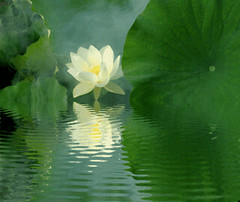ZHI is one of the five “constant virtues” Confucius upholds, other four being human-heartedness (REN), appropriateness (YI), propriety (LI), sincerity or good faith (XIN). In traditional Chinese, the word 智, wisdom, shares the same character with ZHI, so un-like the clear distinction between wisdom and knowledge in English, it is hard to define ZHI with one of these meanings.
In several passages, Confucius seems have given us a definition of ZHI. For instance, in IX - 28, Confucius said “ 知者不惑”, translated as “a wise man is free from doubts”1, or “the wise are not flustered”2, or “with wisdom, there’s no delusion”3. ZHI, here, as wisdom, seems to be a mystery-solver. But it doesn’t say about what doubts or delusion a wise man is free from. Does it mean that a man of ZHI has no doubts whatsoever and is clear about everything? Then this concept of ZHI would be so broad that no one is ever able to achieve it.
In VI - 22, when Fan Ch’ih asked about wisdom, Confucius gave him a more detailed explanation of what a people with ZHI would conduct himself. “Devote yourself to these duties which are proper to the people; and respect the spirits but maintain the proper distance from them. This May be called wisdom.”4
Other translations of the same passages include:
Fan Ch’ih asked about knowing. He said: put your energy into human equities, re-spect the spirits and powers of the air and keep your distance, that can be called know-ing.2 Or, “To work for the things the common people have a right to and to keep one’s distance from the goods and spirits while showing them reverence can be called wis-dom. ”5 Or, “To work for what is right for the people and to respect the spirits and gods from afar, can be considered wisdom.”3
There’re two objects in this paragraph: the people, and the ghosts and spirits. Wis-dom, therefore, is one’s way of dealing with these two objects. As to the people, a person of ZHI is a person who not only behaves appropriately, but also cares about and strives to do what is appropriately for them. As to the ghosts and spirits, one should respect from afar.
Why?
This is, as far as I’m concerned, the key question in revealing the meaning of ZHI. My understanding is that while it is fairly easy to understand what is appropriate to the people, it is almost impossible to determine if something is appropriate to the ghosts and spirits, for they are mysterious and inconstant. When the object itself is unap-proachable and inconsistent, it will only be thoughtless to pursue after it.
The most proper meaning of ZHI would be “to understand”. Because you may say “I know there are ghosts in the world” or “I know about the ghosts”, but you can never say “I understand there’re ghosts” or “I understand the spirits” as they are not real. ZHI is the understanding of something real. Moreover, the passage defines a person of ZHI as to one who exerts oneself to do what is appropriate. So it adds yet more sense of the word ZHI, which means understanding of real and appropriate things.
Still there is another question, does this ZHI comes naturally, are persons born with ZHI? If not, then how does one acquire it?
There’s an interesting passage worth our attention, in which Confucius says: “I am not one who is born knowing it. I am one who loves antiquity and diligently pursues it.”6
Could Confucius be regarded as a born-knowing person? What’s his purpose of dis-claiming his knowing?
Zhang [Xuan] said, “To say this is to exhort others to learn”. Zhu Xi’s reading was: One who is born knowing it is of pure, clear psycho-physical stuff (QI): his moral princi-ple manifests itself clearly. He knows without the need of learning. 6 In Zhu’s reading of the passage, all human beings are born with good human nature and a particular al-lotment of QI (psycho-physical stuff). Dense, turbid psycho-physical stuff obstructs the realization of the inner goodness with which we are endowed. By contrast, pure, refined stuff allows the goodness to become perfectly manifest. To be born knowing it is to be born with the purest and most refined endowment of human nature in all its moral goodness. In Zhu’s mind, Confucius was indeed born with an exceptional endowment of psycho-physical stuff. Thus in this sense, he was certainly born with the understanding, that is, the understanding of the moral principle that is human nature.
Mr. Yin [Tun] said “That Confucius, a sage born knowing it, always speaks of fond-ness for learning, is not only to motivate others. It would seem that what can be known at birth is simply moral principle. As for ritual, music, names and their things, and the changing affairs past and present, these indeed must be learned, and only afterward can we test their truth.” 6
Citing Yin Tun, Zhu goes on to make a distinction - one that probably was intended to help reconcile his assertion that Confucius was born understanding it - from Confu-cius’ own disclaim here. The reader is informed that the knowledge possessed innately by the Master was the moral understanding of right and wrong, not the knowing of eve-ryday affairs and matters. These affairs - including ritual, music, and past and present events - must be learned and assessed for their truth. Learning therefore remained cru-cial even to a sage like Confucius if he were to conduct himself appropriately in these everyday affairs and matters.
Now it seems that I can end the essay with the conclusion that ZHI to Confucius means the understanding appropriateness, and a person of ZHI should act upon what is appropriate and be able to distinguish right and wrong. It’s more of a moral sense than an intellectual sense. But how, then, do persons acquire this understanding if they are not born with it? More importantly, when they have acquired it how can they evaluate it; how does one distinguish the true from the false? And what is virtue? It is said that one should practice the Way, but how does one find out what the Way is? What is the great standard by which all things are to be measured?
Does Confucius provide us the answers?
Sadly, no.
He has no such standards. At least, there’s no such statement in the Analects. Nor did he say that the standards could be found in any other book. Nevertheless, the mere fact that he never states in the Analects that antiquity or certain books provide the ulti-mate basis of truth, does not prove that he did not think they did. As quoted above, Con-fucius said: “I am one who loves antiquity and diligently pursues it.” 6 In other versions, “pursue” is also translated as “investigate”. It is also noted in the Great Learning that “ the extension of knowledge lay in the investigation of things. Things being investigated, knowledge became complete. Their knowledge being complete, their thoughts were sin-cere. Their thoughts being sincere, their hearts were then rectified. Their hearts being rectified, their persons were cultivated. Their persons being cultivated, their families were regulated. Their families being regulated, their states were rightly governed. Their states being rightly governed, the whole kingdom was made tranquil and happy.”7 This statement has been known as the “eight ethic-political items”, but basic to all, of course, is the cultivation of one’s own self.
From above, we can infer that pursuing/ investigating of the past is one of our chief way to getting near ZHI. But no matter pursuing or investigating, it must be done me-thodically. “The Master said, ‘I could describe the ceremonies of the Hsiâ dynasty, but Chî cannot sufficiently attest my words. I could describe the ceremonies of the Yin dy-nasty, but Sung cannot sufficiently attest my words. (They cannot do so) because of the insufficiency of their records and wise men. If those were sufficient, I could adduce them in support of my words.’”8
Not everything is equally reliable as evidence, however. We must always keep our eyes open, learning all we can from experience. Yet we cannot expect to understand eve-rything; we must understand what we can, and concerning the rest maintain suspended judgment. After all, “The Master said: ‘To be fond of something is better than merely to know it, and to find joy in it is better than merely to be fond of it’”. 5
Now we can draw the conclusion that ZHI (often translated as knowing) means the understanding appropriateness and the ability to distinguish right and wrong which could only be acquired through arduous learning and careful investigation of the past experience.
skip to main |
skip to sidebar






























Blog Archive
-
▼
2006
(1010)
-
▼
October
(62)
- One for the Monk.
- Fun jewelery at FANCY.
- How to be clean of mind and body.
- Six word stories.
- Geeky cat humor.
- Designer geekery.
- Technical difficulties. Please stand by.
- I love this photo.
- My kind of politicking.
- Headline of the day.
- Impressive Halloween costume.
- 1stdibs.com is the best.
- For XTC fans.
- Light + brick = heat.
- Design for the birds.
- Sweet "Blossom" lights... from dELiAs??
- this is what i was put on earth to do
- Halloween guinea pig.
- Blik's Autographics.
- Skuggflora Fläder :: Self-adhesive vinyl illustrat...
- Biodegradable Plates, Cups & Utensils
- Freeze your shadow.
- Heaven and Man as One
- Herman Yu Calendar.
- Zheng Ming
- Get yer Day of the Dead supplies here.
- Beautiful antique Russian cameras.
- A Friday chuckle.
- Really, really odd collectibles.
- "Scrabble pillows!"
- Concrete. It's not just for sidewalks anymore.
- Fun CD cover.
- Love the lamps.
- In a perfect world, all office supplies would be t...
- A poor man's Photoshop.
- The Museum House by Li Edelkoort
- Govern by Li, or Govern by Law
- Beautiful photos of the Milwaukee Art Museum.
- Hotels With A Past.
- Colleges' Reconstruction in East & West
- The Many Aspects of XIAO
- He > Harmony
- Thought for the day.
- Vanity Fair Oscar Party contest.
- A toasty one for the Czelt.
- I'd buy one of these just for the ring.
- Walking on water.
- Fall leaves
- To ZHI is to Understand
- One for Doreen.
- AIESEC Interview
- McSweeney's "A Convergence of Convergences" contes...
- "Color my underwear important."
- Eureka!
- Shadowplay.
- Wickedly cool purses for bookish types.
- Feeding my mixed media obsession.
- A new sort of calendar.
- This ain't no pocket camera.
- Designer chocolates.
- The Chemical Brothers vs. The Rock Drill
- Kitsch, but cute, reading light.
-
▼
October
(62)
